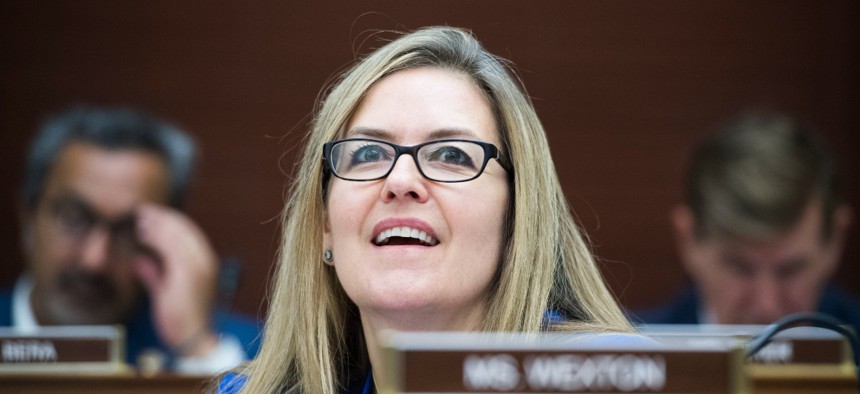
Rep. Jennifer Wexton, D-Va., is one of the lawmakers who introduced the bill. Tom Williams/CQ Roll Call via Getty Images file photo
Agencies Would Have to Think Harder Before Relocating, Under a New Bill
The legislation comes after a watchdog agency concluded hastily conducted relocations during the Trump administration caused staff exoduses and harmed agencies’ service delivery.
Democrats in both chambers of Congress last week introduced legislation aimed at ensuring future agency relocation proposals are sufficiently vetted before they are implemented, following a string of hasty moves during the Trump administration that harmed the agencies’ missions.
During the previous administration, officials relocated the Agriculture Department’s Economic Research Service and National Institute of Food and Agriculture from Washington, D.C., to Kansas City, Mo. Department leaders declined congressional requests to release the cost-benefit analyses undergirding the relocation decisions, and set an aggressive timeline for implementation in an apparent effort to prevent lawmakers from successfully blocking the plan.
Following the move, both agencies lost more than half of their staff, leading to a significant loss of productivity. Economic Research Service-published journal articles and research reports fell by half between fiscal 2018 and 2020, while the National Institute of Food and Agriculture experienced delays in the processing and funding of grants during the same time period.
Since the relocations, the Government Accountability Office found that the Agriculture Department developed a system for evaluating plans to relocate the agencies but ultimately chose not to follow it. And although staffing ultimately returned to pre-2018 levels in 2022, GAO found that both agencies suffered from a loss of institutional knowledge, while diversity metrics fell precipitously.
The Conducting Oversight to Secure Transparency (COST) of Relocations Act (H.R. 1106), introduced by Rep. Jennifer Wexton, D-Va., and Sen. Chris Van Hollen, D-Md., would require federal agencies to conduct a cost-benefit analysis in accordance with federal best practices ahead of any relocation effort. That analysis would then be submitted to the agency’s inspector general and Congress for review and eventual publication.
The report would require an analysis of both quantitative data like real estate and staffing costs, as well as what the lawmakers described as “qualitative metrics,” such as employee attrition and any potential impacts to the agency’s mission or delivery of services.
Wexton said the bill would prevent future administrations from engaging in what she described as “politically motivated” decisions to upend the lives of federal workers. The Trump administration’s efforts to move agency headquarters out of the Washington, D.C., region were characterized in 2019 as a “wonderful way” to reduce the size of the federal workforce by then-Office of Management and Budget Director Mick Mulvaney.
“The recent GAO report examining the Trump administration’s relocation of two USDA research agencies shines new light on just how devastating the moves were on the agencies’ mission and workforce—and we cannot let this kind of haphazard move happen again,” Wexton said. “I’m proud to take a stand with Sen. Van Hollen to prevent these types of politically motivated attacks on our nonpartisan federal workforce and defend the integrity of the essential work our civil servants perform for the country.”
Following news of the relocation, the workforces of both the Economic Research Service and National Institute of Food and Agriculture unionized through the American Federation of Government Employees, citing a desire to have a greater say regarding their working conditions. The union now supports Wexton and Van Hollen’s legislation, as do the Project on Government Oversight and the Union of Concerned Scientists.
“AFGE applauds Rep. Wexton for introducing the COST of Relocations Act to fight the uprooting and diminishing of institutional knowledge and expertise at federal agencies,” AFGE National President Everett Kelley said. “AFGE strongly supports a fully funded and staffed up federal government, which includes ensuring agencies do not close, consolidate or get relocated.”







